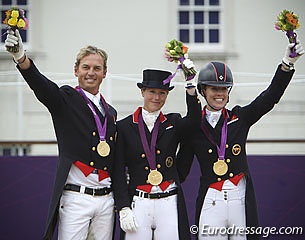
The British dressage team wrote history today by winning team gold at the 2012 Olympic Games in London. Not only is this Britain’s first ever Olympic dressage medal since the sport's appearance in the 1912 Games, but Charlotte Dujardin, Carl Hester and Laura Bechtolsheimer immediately took it to gold. The silver went to Germany, the bronze to The Netherlands.
The riders, grooms, crowds, the press, everyone sensed that something very special was to happen at the Greenwich Park Olympic equestrian venue. Taking a minimal lead in the provisional team ranking after the Grand Prix, Team GB were still the hot favourites for gold and it was mission accomplished thanks to the team members' three high calibre Grand Prix Special rides.
Just like in the Grand Prix Charlotte Dujardin ruled the roost with an immaculate test aboard Carl Hester and Roly Luard's 10-year old Dutch warmblood gelding Valegro (by Negro x Gershwin).
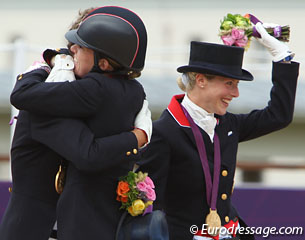 The pair had a good halt at entry and executed outstanding trot extensions, passage reprises and trot half passes. The horse was very consistent in the contact and alwayswas up in the bridle, even though the left snaffle rein could have been a bit looser. The exended walk was ok but the strides can be longer. The piaffe-passage on the serpentine was outstanding. The horse was effortless in the collection and transitions, though the strike-off to canter was slightly short behind. The canter half passes were well controlled, the two tempi changes straight and ground covering, but in the ones there was an imperfection at the start. After very nice pirouettes and a wonderful final centerline, the crowds went ape and gave the rider a standing ovation as she left the stadium. Dujardin posted a score of 83.286%, placing first with all seven judges.
The pair had a good halt at entry and executed outstanding trot extensions, passage reprises and trot half passes. The horse was very consistent in the contact and alwayswas up in the bridle, even though the left snaffle rein could have been a bit looser. The exended walk was ok but the strides can be longer. The piaffe-passage on the serpentine was outstanding. The horse was effortless in the collection and transitions, though the strike-off to canter was slightly short behind. The canter half passes were well controlled, the two tempi changes straight and ground covering, but in the ones there was an imperfection at the start. After very nice pirouettes and a wonderful final centerline, the crowds went ape and gave the rider a standing ovation as she left the stadium. Dujardin posted a score of 83.286%, placing first with all seven judges.
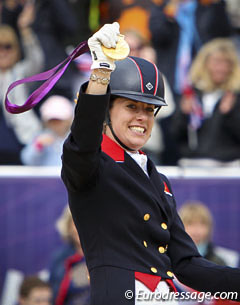 "My legs were like jelly, I was more nervous in there; I didn’t ride like I knew I could but he still felt really good," Dujardin told British Dressage. "It’s so surreal but it was the ultimate dream to get here and win gold; Valegro’s the horse of a lifetime."
"My legs were like jelly, I was more nervous in there; I didn’t ride like I knew I could but he still felt really good," Dujardin told British Dressage. "It’s so surreal but it was the ultimate dream to get here and win gold; Valegro’s the horse of a lifetime."
The 27-year old Dujardin is a huble heroine giving full credit to her trainer Carl Hester at the press conference. "I owe everything to him for being here," said Charlotte. "The training, the fantastic horses to ride. He's very special to me. Thank you." Training and working at Carl's yard for the past six years, Dujardin was given the ride on the best horse of the barn, Valegro, because three-time Olympian Hester is a strong believer in providing young talent the opportunity to rise. "She has feel and an amazing temperament," her coach added.
Carl Hester and his own and Sasha Stewart's 11-year old Dutch warmblood stallion Uthopia (by Metall x Inspekteur) were the second best scoring British pair, finishing third in the Special with 80.572%. While the horse left a good but somewhat safe impression in the Grand Prix, today the black stallion was back to Rotterdam form and shone brightly! The expression on Carl's face during the test said it all: utmost concentration as if the rider knew that he needed to add a notch to reach Olympic glory. Hester was the bold pilot in the driver's seat.
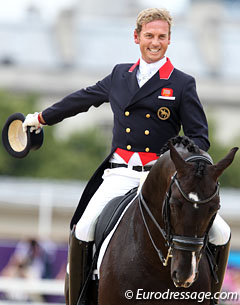 The petite stallion was very energetic, buoyant and engaged. His trot extensions put the higest scores on the board. The half passes could have had slightly more suspended. The passage was radiant and regular. In extended walk the horse had two hooves overstap but the strides should be longer, so a clearer V can be seen. In the first piaffe the rhythm could have been more articulated from the start but the second one was better. The two tempi's were big, the ones good, the canter half passes were nice as well as the pirouettes. The final piaffe at X was a bit timid, but Hester made it all look very harmonious and light, the way dressage should be!
The petite stallion was very energetic, buoyant and engaged. His trot extensions put the higest scores on the board. The half passes could have had slightly more suspended. The passage was radiant and regular. In extended walk the horse had two hooves overstap but the strides should be longer, so a clearer V can be seen. In the first piaffe the rhythm could have been more articulated from the start but the second one was better. The two tempi's were big, the ones good, the canter half passes were nice as well as the pirouettes. The final piaffe at X was a bit timid, but Hester made it all look very harmonious and light, the way dressage should be!
"I was really, really pleased with that; I’m absolutely thrilled," Hester told British Dressage. "I’ve lacked some confidence coming into this, I’ve only ridden the test once [at the CDI Fritzens] and the score wasn’t so good so to come here, to better the mark by 5% and here of all places is amazing. The horse is the same here as in the arena at home and I can’t tell you what a comfort it is to have that."
With the scores of all three team members counting in this Olympic format, long-time British anchor Laura Bechtolsheimer was now the third rider on the team with a 77.794% and still impressive fifth place. Aboard her 17-year old Danish warmblood gelding Mistral Hojris (by Michellino x Ibsen), Laura had a fresher force under the saddle. Mistral was back to his old form with piaffe and passage unbeatable in its pure rhythm, but the same power resulted in a stronger contact in the mouth and more visible half halting from the rider. Nevertheless "Alf" looked good. Superb half passes, solid extended trots. The onset of the first piaffe was a bit hairy but Bechtolsheimer and Mistral proceeded with great style. The past year the tempi changes have become Laura's bete noire and it was no different today. There was an issue at the beginning of the ground-covering two's and twice the horse made a double beat in the ones, not changing through with his right hind leg. The ones on the centerline were good. The last centerline had good energy and rhythm even though the horse became a bit crooked to the right.
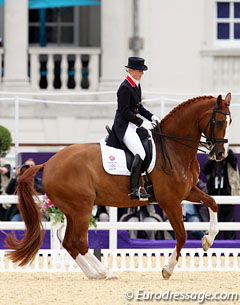 After her test, Laura commented that "the old Alf’s back, he felt fantastic. He gave me the performance of a young horse which makes me feel really emotional. He felt fantastic and even though we had a few costly mistakes I was so pleased. I feel so privileged to be part of the evolution of dressage, today has been so special. The crowd – there’s nothing like it, it’s amazing to have all those people behind you."
After her test, Laura commented that "the old Alf’s back, he felt fantastic. He gave me the performance of a young horse which makes me feel really emotional. He felt fantastic and even though we had a few costly mistakes I was so pleased. I feel so privileged to be part of the evolution of dressage, today has been so special. The crowd – there’s nothing like it, it’s amazing to have all those people behind you."
When asked what it feels like to be a gold medallist, Laura said "I’ve been asked this question so many times and finally being able to answer seems bizarre!” she said. “It’s very emotional. I always thought that to come here and win any medal would be amazing, but to win gold . . .it’s an incredible feeling. We are very proud of each other and of our horses."
The 23,000 sell-out crowd in Greenwich could not be but inspired by the wonderful rides of the British team riders, which all come from very different backgrounds. For the first time in history, Britain got an Olympic medal in dressage and straight away it rushed to gold. "You got three people here from different backgrounds that made out this team. That aside, we have all made it to this level," Hester said about being an inspiration. "Charlotte came through the pony world, worked her way up to be a groom. I came from (the Isle of) Sark, which is the most ridiculously small island in the world. I worked as a groom for many years. Laura did pony club across all disciplines before she chose for dressage. My parents can't stand horses, which makes it even more ridiculous that I ended up on this route. It shows that hard work and dedicatio have paid off for all three of us."
German Rookies Go for Silver
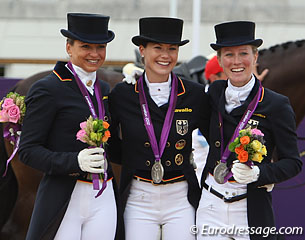 The German ladies trio and Olympic debutantes worked their way up to silver and were glad to have "won" silver instead of "losing" gold. The 30-year old Langehaneberg was Germany's leading rider with a fourth place finish (78.936%) on Damon Hill (by Donnerhall x Rubinstein).
The German ladies trio and Olympic debutantes worked their way up to silver and were glad to have "won" silver instead of "losing" gold. The 30-year old Langehaneberg was Germany's leading rider with a fourth place finish (78.936%) on Damon Hill (by Donnerhall x Rubinstein).
Helen Langehanenberg and Christian Becks' liver chestnut stallion were not as good as in the Grand Prix, regularly dropping behind the vertical and getting on the forehand in the piaffe despite the major lift in his legs. Overall there were plenty of fantastic highlights to explain the top score! The passage was superb with amazing bounce. The half passes were lovely, the extended walk one of the best of the day and the transition from walk to piaffe was very obedient even though he took a major step out of the piaffe to passage. The following passage - piaffe - passage bit was wonderful. The canter work started with good half passes and two tempi's but in the ones there was a short change behind. The pirouette left was a bit big, the right one super. The final centerline was very nice again.
Although Langehanenberg didn't crack the 80% in the Special, she is confident that the freestyle will present a different picture. "I'm really looking forward to it (the kur)," she said. "I love to compete in the freestyle and Dami as well. He loves to go to music. Tomorrow we'll do a little bit of work, not too hard, and then we go for it," she said clucking her tongue!
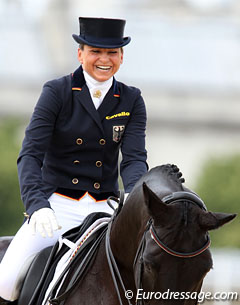 Dorothee Schneider and Stella Charlott Roth's 10-year old Hanoverian mare Diva Royal (by Don Frederico x Warkant) finished sixth with 77.571%. The rather old-fashioned looking mare is gorgeous in the way she moves. The trot half passes were big but could have been more elastic, the passage was very powerful from behind and totally regular. The mare made smooth transitions from passage to extended trot and back. The extended walk was very good. The first piaffe was a couple of meters before the marker but the mare sat nicely on the hindquarters and executed flawless transitions. The tempi changes were scopey and Diva Royal travelled well in the canter half passes. The pirouette right was the best one of the two. In the extended canter the black could have been more uphill and put the hind legs more under the point of gravity.
Dorothee Schneider and Stella Charlott Roth's 10-year old Hanoverian mare Diva Royal (by Don Frederico x Warkant) finished sixth with 77.571%. The rather old-fashioned looking mare is gorgeous in the way she moves. The trot half passes were big but could have been more elastic, the passage was very powerful from behind and totally regular. The mare made smooth transitions from passage to extended trot and back. The extended walk was very good. The first piaffe was a couple of meters before the marker but the mare sat nicely on the hindquarters and executed flawless transitions. The tempi changes were scopey and Diva Royal travelled well in the canter half passes. The pirouette right was the best one of the two. In the extended canter the black could have been more uphill and put the hind legs more under the point of gravity.
"She is such a positive character," Schneider said about Diva Royal. "She wants to present herself in the arena and gets 10 centimeters bigger. She wants to do all in a good way. She is a diva, but in the positive way." Schneider is a seasoned professional who after 20 years of being a competition rider saw her dream come through thanks the genorisity of her student Stella Charlott and the owners of the mare, the Roth family, who enabled Dorothee to pursue this Olympic path. After the Games the mare will be ridden again by Under 25 rider Stella. "In two days it is my last competition with Diva, but I'm very happy to have her here in London," said Dorothee who burst out in tears.
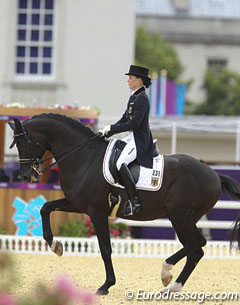 The 25-year old Kristina Sprehe and her father's wonderful Hanoverian stallion Desperados (by De Niro x Wolkenstein II) placed seventh with 76.254%. A big booboo in the passage made the score plunge to the mid seventies region, which was atually a realistic reflection of the produced ride. Sprehe had Desperados nice in the bridle and overall the horse had the poll as highest point. The piaffes were much better althought the steps should level out more. The black stallion always has amazing sit and bounce in piaffe but tends to lean a bit on the forehand. Today he shifted the weight well on his hind legs. The trot extensions were ground covering and especially the half pass left was phenomenal. Unfortunately the stallion bucked and leapt out of one passage, but the young Grand Prix rider recovered quickly. In general the passage lost regularity, especially on bent lines. The tempi changes on the diagonal were big, but in the ones on the centerline Desperados could have had a better self-carriage. Despite a hesitation in the final passage, Sprehe showed remarkable self-assurance and did a great job facing the challenges in the test.
The 25-year old Kristina Sprehe and her father's wonderful Hanoverian stallion Desperados (by De Niro x Wolkenstein II) placed seventh with 76.254%. A big booboo in the passage made the score plunge to the mid seventies region, which was atually a realistic reflection of the produced ride. Sprehe had Desperados nice in the bridle and overall the horse had the poll as highest point. The piaffes were much better althought the steps should level out more. The black stallion always has amazing sit and bounce in piaffe but tends to lean a bit on the forehand. Today he shifted the weight well on his hind legs. The trot extensions were ground covering and especially the half pass left was phenomenal. Unfortunately the stallion bucked and leapt out of one passage, but the young Grand Prix rider recovered quickly. In general the passage lost regularity, especially on bent lines. The tempi changes on the diagonal were big, but in the ones on the centerline Desperados could have had a better self-carriage. Despite a hesitation in the final passage, Sprehe showed remarkable self-assurance and did a great job facing the challenges in the test.
"He quickly recovered and worked super with me in the rest of the test," Sprehe said about her mistake. "Of course the error was disappointing." The timid Kristina added that after the Games her stallion "will get a breeding break and then together with my trainer I'll make a plan for the summer."
The German team, which has held an Olympic golden streak since the 1984 Games, stated that it hasn't lost gold, but won silver. "We have a good time here in Great Britain. We enjoy it. We really are a team, every part of it. We have won silver, not lost gold. We are new at the Olympics. We are young with fresh horses. We have given it our best and are really happy," Langehanenberg stated. German chef d'equipe Klaus Roeser added that "the team did a great job. We congratulate the British, but await the freestyle!"
Team The Netherlands Grabs the Bronze
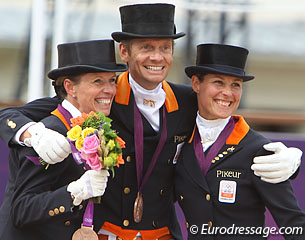 Leaving behind the 2008 Olympic bronze medal winning team of Denmark with 3.28%, team The Netherlands confidently captured the bronze medal and third step on the podium. Captain of the team, 33-year old Adelinde Cornelissen, hoisted the team average to bronze proportions with her second place finish and 81.984% score.
Leaving behind the 2008 Olympic bronze medal winning team of Denmark with 3.28%, team The Netherlands confidently captured the bronze medal and third step on the podium. Captain of the team, 33-year old Adelinde Cornelissen, hoisted the team average to bronze proportions with her second place finish and 81.984% score.
Cornelissen and her 15-year old Dutch warmblood gelding Parzival (by Jazz x Ulft) were on better form today and their major weak point, the poor and omnipresent strong contact with the bit, was to a certain extent better and lighter in the Special with the sensitive chestnut less distracted by his surroundings. The overall silhouette of the horse was now more pleasing to the eye, but Cornelissen stayed behind Dujardin as the Beilen based rider was unable to reach the same level of correctness as Valegro.
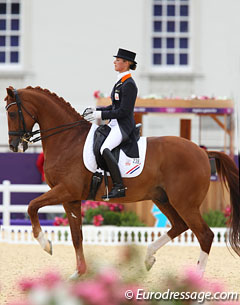 Parzival was lovely in the piaffe and trot half passes. He sprang almost half a meter off the ground with much light-footedness and grace, but he did not sit properly in the piaffe, pulling the hocks slightly high, and in passage the croup came high. In the half pass left the hindquarters trailed a bit, but the right ones were wonderful. The extended walk had good relaxation. The tempi changes were as straight as an arrow. Parzival had some loss of self carriage in the canter half pass right and the contact became strong in the pirouette right, even though the pirouettes were tiny and on the spot. In the final passage on the centreline the horse became a bit crooked to the right and lost the rhythm of the passage before the halt.
Parzival was lovely in the piaffe and trot half passes. He sprang almost half a meter off the ground with much light-footedness and grace, but he did not sit properly in the piaffe, pulling the hocks slightly high, and in passage the croup came high. In the half pass left the hindquarters trailed a bit, but the right ones were wonderful. The extended walk had good relaxation. The tempi changes were as straight as an arrow. Parzival had some loss of self carriage in the canter half pass right and the contact became strong in the pirouette right, even though the pirouettes were tiny and on the spot. In the final passage on the centreline the horse became a bit crooked to the right and lost the rhythm of the passage before the halt.
"It was impossible to realise a score on my own that would overtake the Germans," Cornelissen said. "Because Edward and Anky produced a top performance I didn't have to give it my all." Cornelissen will ride her old Nutcracker/Swan Lake freestyle on Thursday.
Whereas Cornelissen and Parzival improved in form, Edward Gal was unable to achieve his Grand Prix test level on the 11-year old Dutch warmblood gelding Undercover. The Ferro x Donnerhall offspring was very tense and Gal deliberately (over)collected the horse throughout the test. Even though Undercover has improved tremendously over the past few months, once relaxation is achieved Gal will actually have a higher scoring horse. Yet today the horse was wired.
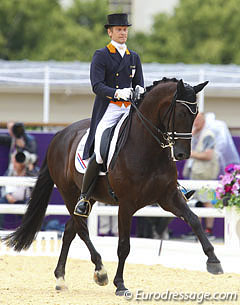 The halt at entry was not entirely immobile, the trot was extremely collected with very expressive half passes of which the left one was executed under tempo. The passage was electric and off the ground but should have been more forward. In the passage left the horse was a bit uneven with more right hindleg activity. The extended walk had only one hoof overstep. In the piaffe-passage on the serpentine, Gal obtained a very steady rhythm but the passage barely moved forward. The transitions to and from piaffe, however, were flawless! The same happened in canter. In collected canter the horse almost cantered on the spot. Both diagonals with tempi changes were correct but did not cover enough ground. In the pirouettes the horse did not shift the weight on the hindquarters but made tiny canter strides on a small circle. The extended canter was explosive. Gal knows his horse and he can masterly make the best out of each situation. He did not ride the horse in such a degree of collection for no reason as he obtained much more control over each movement and the preparation towards it. However, at the same time the horse showed no natural swing through the body nor any forwardness. The body tension was once more proven by the mobile end halt. Gal scored a high 75.555% to place 10th in the ranking.
The halt at entry was not entirely immobile, the trot was extremely collected with very expressive half passes of which the left one was executed under tempo. The passage was electric and off the ground but should have been more forward. In the passage left the horse was a bit uneven with more right hindleg activity. The extended walk had only one hoof overstep. In the piaffe-passage on the serpentine, Gal obtained a very steady rhythm but the passage barely moved forward. The transitions to and from piaffe, however, were flawless! The same happened in canter. In collected canter the horse almost cantered on the spot. Both diagonals with tempi changes were correct but did not cover enough ground. In the pirouettes the horse did not shift the weight on the hindquarters but made tiny canter strides on a small circle. The extended canter was explosive. Gal knows his horse and he can masterly make the best out of each situation. He did not ride the horse in such a degree of collection for no reason as he obtained much more control over each movement and the preparation towards it. However, at the same time the horse showed no natural swing through the body nor any forwardness. The body tension was once more proven by the mobile end halt. Gal scored a high 75.555% to place 10th in the ranking.
"I"m still very glad it went so well," Gal said after his test. "We have only been a combination for seven months and it's too short to produce a flowing Special." When asked if Gal knew two years ago he would be back on a medal winning team so fast after the sale of Totilas, the sympathetic Dutch rider replied that, "I didn't know for sure, but it was my goal to keep on riding. I think I have a really good horse again. I have him for seven months. It takes time. We have bronze and I'm very happy for it."
Third Dutch team rider Anky van Grunsven may not have ridden the highest score in her career today, 74.794% (12th), but the extremely popular Dutch rider did set a new record. With her team bronze she became the most medalled competitor in the history of Olympic equestrian sport. The defending individual Olympic champion and the only dressage rider to take three back-to-back Olympic titles earned her ninth Olympic medal today, outclassing Dr. Reiner Klimke and Isabell Werth.
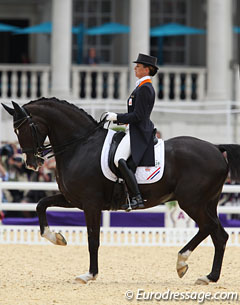 Aboard her 18-year old Hanoverian gelding Salinero (by Salieri x Lungau) Van Grunsven rode a test very similar to Gal's: one with an incredible amount of collection to guarantee total control and no mistakes. The dark bay Salinero looked incredibly fresh and fruity and today the oldtimer showed very little signs of mileage and age in the show ring. The beautifully muscled horse is on flying form for his Rembrandt-style Swang song here at the Olympics.
Aboard her 18-year old Hanoverian gelding Salinero (by Salieri x Lungau) Van Grunsven rode a test very similar to Gal's: one with an incredible amount of collection to guarantee total control and no mistakes. The dark bay Salinero looked incredibly fresh and fruity and today the oldtimer showed very little signs of mileage and age in the show ring. The beautifully muscled horse is on flying form for his Rembrandt-style Swang song here at the Olympics.
The frisky Salinero was back to his old ways -- in several aspects -- as he was not immobile in the halt at entry. The extended trots were conservative but better than in the Grand Prix. The half pass left was the highlight of the test! In passage the gelding should move the hindlegs more under the body and Anky overcollected him each time, making the horse barely cover ground, is if it were a piaffe moving forward. The extended walk was tense and quick with not enough overtrack nor neck-stretch. The first piaffe was good, the transition seamless, the passage too collected, the second piaffe was very nice again. With such control over the rhythm and steps, the transitions to and from were impeccable. Also in collected canter the horse became short in his stride. The extended canter was only carried out until X. There was a double beat in the two tempi's; the ones were mistake-free but slightly croup high. The final centerline was well ridden but the end halt only lasted for two seconds.
"I'm really happy and really proud of my 18-year-old horse Salinero. He's fit and loose and in a good mood, me as well," Van Grunsven said. "After the Olympics I'll keep riding him, like I did with Bonfire. I love riding Salinero, still. I'm really happy with the decision to come here. The freestyle will be his last test. He deserves a good test. For him and for me it will be a great goodbye." Van Grunsven stressed that she will continue riding, while Salinero goes into retirement. "I'm too young to retire," she added.
Peters and Carvalho Present Notable Rides
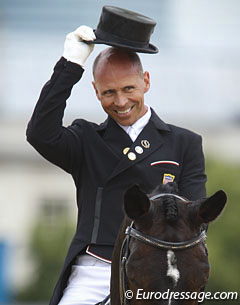 Despite presenting a fit looking 14-year old Ravel, Steffen Peters today struggled to connect with the world's elite, placing seventh with 76.254%. The dark bay gelding (by Contango x Democraat) was better in the piaffe with more rhythm and self carriage, but in passage he could have been a bit fresher from behind. The contact was always nice and soft, which a total joy to watch. Unfortunately in the one tempi's on the centerline he tripped and Peters lost momentum for the series of nine. The pirouette right was superb and Steffen was able to save the pirouette left after getting into trouble with the ones. The pair made a nice finish on the centreline.
Despite presenting a fit looking 14-year old Ravel, Steffen Peters today struggled to connect with the world's elite, placing seventh with 76.254%. The dark bay gelding (by Contango x Democraat) was better in the piaffe with more rhythm and self carriage, but in passage he could have been a bit fresher from behind. The contact was always nice and soft, which a total joy to watch. Unfortunately in the one tempi's on the centerline he tripped and Peters lost momentum for the series of nine. The pirouette right was superb and Steffen was able to save the pirouette left after getting into trouble with the ones. The pair made a nice finish on the centreline.
"I'm very happy. We had a little stumble after the first pirouette, but I thought the piaffes were even better today," Peters commented. "He (Ravel) is still in great form and wants to perform. It is a great honour to represent your nation (at the Olympic Games). It has been three times for us, but I am still excited by it. It is still just as fresh as the first time, especially at a beautiful venue like Greenwich Park."
The rising star of the day was Portuguese Gonçalo Carvalho on Christine Jacoberger's Lusitano stallion Rubi (by Batial). The 14-year old dark bay stallion was in top shape and had improved tremendously compared to his Grand Prix performance. Softer in the contact and more correct in the execution of the movements, Rubi had excellent sit in piaffe, the transitions to and from it were much more regular and flowing. The canter half passes were gorgeous. The pirouette right coud have had more bending. The break-through pair, which also competed at the 2010 World Equestrian Games, finished 13th with 74.222%.
Judging Supervisory Panel in Action
At the press conference following the victory ceremony, FEI Dressage Director Trond Asmyr provided the numbers of interventions the Judging Supervisory Panel made over two classes and three days of competition. "Eighty-five changes were made over three days out of 12,600 marks given," said Asmyr. In the Grand Prix Special (with 32 horses) 26 marks were changed, in the Grand Prix (with 50 horses) 59 changes were made.
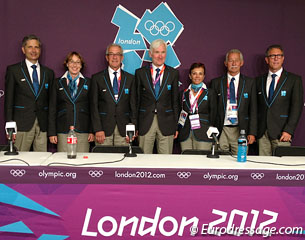 "It sharpens our judging," said Danish O-judge Leif Tornblad. "We are very happy to have the JSP to intervene. It makes us more secure. It is all very clear and we are very happy with what they have changed for us. It's a security. We try to avoid being caught and we judge better because of it."
"It sharpens our judging," said Danish O-judge Leif Tornblad. "We are very happy to have the JSP to intervene. It makes us more secure. It is all very clear and we are very happy with what they have changed for us. It's a security. We try to avoid being caught and we judge better because of it."
American O-judge Gary Rockwell added that "the level of competition is amazing. This is my second Olympics. I came in when Anky and Isabell raised the bar at their time. The one who made a mistake lost. Here there is such a strong group of quality riders and horses, so we knew it wouldn't be easy."
Rockwell agreed that the JSP is a welcome addition to the judging system. "The rider now gets the benefit of the doubt," he said. "If we are wrong, the score gets corrected. It's fair to the rider to have the benefit of a correction if it needs to be made."
Text and Photos © by Astrid Appels - No Reproduction Allowed
Related Link
Eurodressage On the Scene at the 2012 Olympic Games